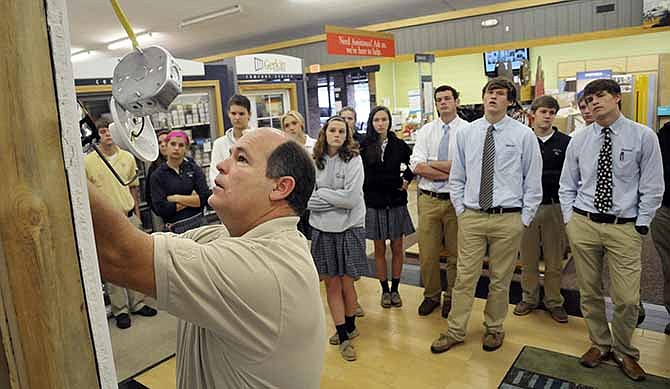Practical lessons that used to be de rigueur in American schools are making at a comeback at Helias Catholic High School this fall, ever since teacher Ron Vossen was given the go-ahead to teach life skills to his teenage students.
Basic tasks that once were common knowledge - such as sewing on a button or changing the oil in a car - are being reintroduced. More than 90 Helias students, filling three sections, signed up for Vossen's "Life Skills for the 21st Century" class.
The course is a mash-up of old-school home economics and shop curricula, with a liberal dash of personal finance thrown in for good measure.
Vossen - who typically teaches architectural drafting - was inspired to offer the course after taking note of the kind of information his own children needed to succeed in life. "These are things my kids didn't know how to do," he said.
Three seniors - Becky Roberts, Hannah Dudenhoeffer and Trent Dudenhoeffer (who are distantly related cousins) - decided to sign up. All said the class has been worthwhile so far, they said.
"I didn't know how to sew on a button," Roberts said.
Hannah Dudenhoeffer added learning how to read a map has been useful. "I always use a phone," she said.
So far, the students have learned how to patch a drywall hole, properly paint a room and iron a shirt - another task Roberts had never undertaken.
"There is more than one kind of paint," Trent Dudenhoeffer said in a surprised tone.
They've gleaned some basic automotive maintenance skills, such as changing a flat, checking the engine oil and replacing windshield wipers.
The class also includes a healthy dose of personal finance information. The kids learn some basic investment strategies, including knowing the difference between stocks and bonds. Arranged in teams, the students picked their own stocks and followed them for a few weeks to note how they perform.
Trent Dudenhoeffer, the son of a local banker, was chagrined to see his stock pick wasn't very good. Confident going into the project, he said he's more modest today. "My dad works at Jefferson Bank, and I thought I would be big-man-on-campus," he lamented. "I learned day trading is not a good idea."
Students also have learned how to create a checking account, handle credit cards responsibly and make insurance decisions. They also were given tips for avoiding identity theft.
Vossen said he also wanted students to learn how to be more thrifty with their
shopping habits, make sound nutritional choices and practice cooking meals. A trip to Schulte's Fresh Foods yielded advice on how to save on grocery purchases and a few free donuts.
He noted that many young people, when they rent that first apartment, don't know what to anticipate from their lease and aren't aware that utilities, when added up, can equal the rent payment.
The students also have to come up with their own weekly lists of tips that they e-mail to the teacher and they have to demonstrate a skill they wanted to learn more about.
The class isn't designed to reject technology, but instead to expand beyond it and use it purposefully.
"We do use technology to learn things, but the class is more hands-on," Vossen said. "And I hope it's building communication skills."
Vossen said the curriculum might not be comprehensive. "But they have at least a little background information to move on, so they can know who to ask and where to go. And not be afraid to ask a question," he said.

